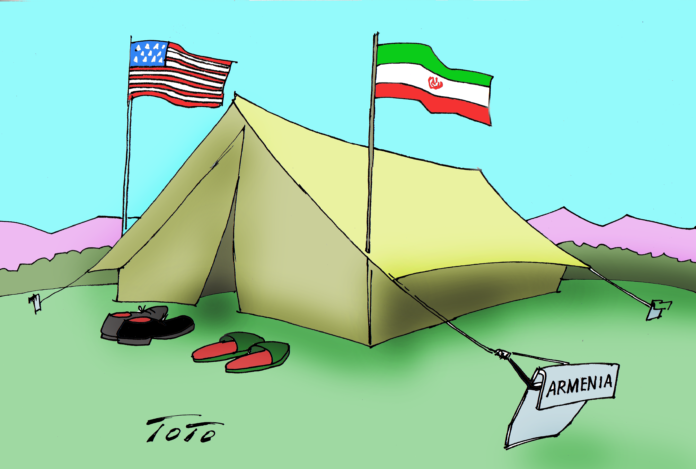Armenia had hardly regained domestic peace as a result of the Velvet Revolution, when urgent foreign policy issues began amassing on its borders. Constant threat of war with Azerbaijan is already a permanent problem against which Armenia has taken the appropriate measures, and it has survived such threats over the last quarter century.
As the new government puts its house in order, much more pressing issues will take up its attention. Strained relations with Moscow have already resulted in an undeclared blockade of Armenia’s agricultural products. Much of Armenia’s agricultural trade has been with Russia and indirect pressures on that trade have always come from Georgia, which is lined up with Armenia’s enemies in choking the landlocked country. Armenia’s precarious trade with Russia transits through Georgian territory, and more often than not the Georgian government closes down the main route at Upper Lars to block or slow down the movements of people and goods. This time around that passage is blocked by the Russian side, keeping trucks stranded for days on end. Most of the time these trucks return to Armenia empty, after unloading the rotten agricultural products at the Russian border. This is, of course a subtle message from Moscow after the stern warning by its foreign minister Sergey Lavrov.
But a more imminent and urgent problem has been arising on the Iranian border, where Iran has proven to be a reliable trading partner for Armenia. Although the threat is not directed to Armenia per se, its impact may turn to be more devasting; that threat is presented in the form of economic sanctions that the Trump administration intends to impose on Iran. Of course, the last thing on Mr. Trump’s mind could be how his sanctions may affect Armenia.
Thus, Armenia becomes an unwilling participant in an international game and a hostage to the US-Iran stand-off.
The recent change in the US policy has short term and long term goals. The short term goal pursued by neocons is to reduce Iran to the level of Iraq, Syria and Libya; in other words, not to have any regime that can challenge or undermine Israel’s hegemony in the region. But the long- term goal is a tectonic shift with global implications. In today’s unipolar world, Europe is highly dependent on America and that is to Washington’s liking. But the consideration that the ambitious rise of China, extending its economic silk route to Europe and bypassing Russia, may potentially help lead to the emergence of a bi-polar or tri-polar world down the road has alarmed US policy planners. On that political chessboard, India is another contender for European trade.
The Caucasus region is on the path of these two rising Asian powers, which the US wishes to use one against the other to forestall or slow down the reconfiguration of the dreaded multipolar political world. Therefore, in preparation for a US policy extending over the next full century, US Secretary of State Mike Pompeo is intending to reshape the corridor from the Persian Gulf to the Black Sea, and Armenia is on the way.










